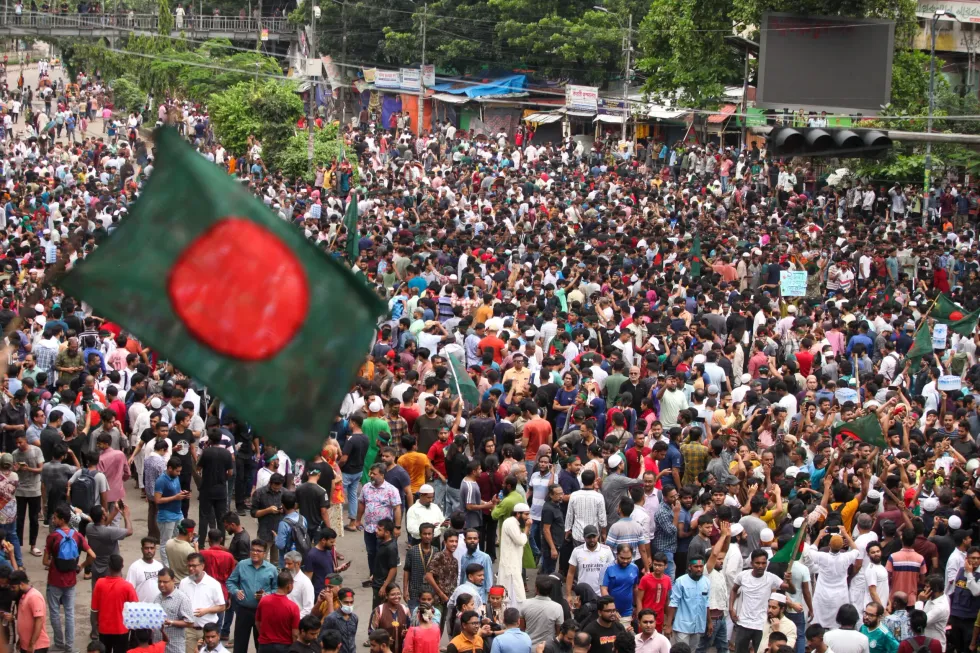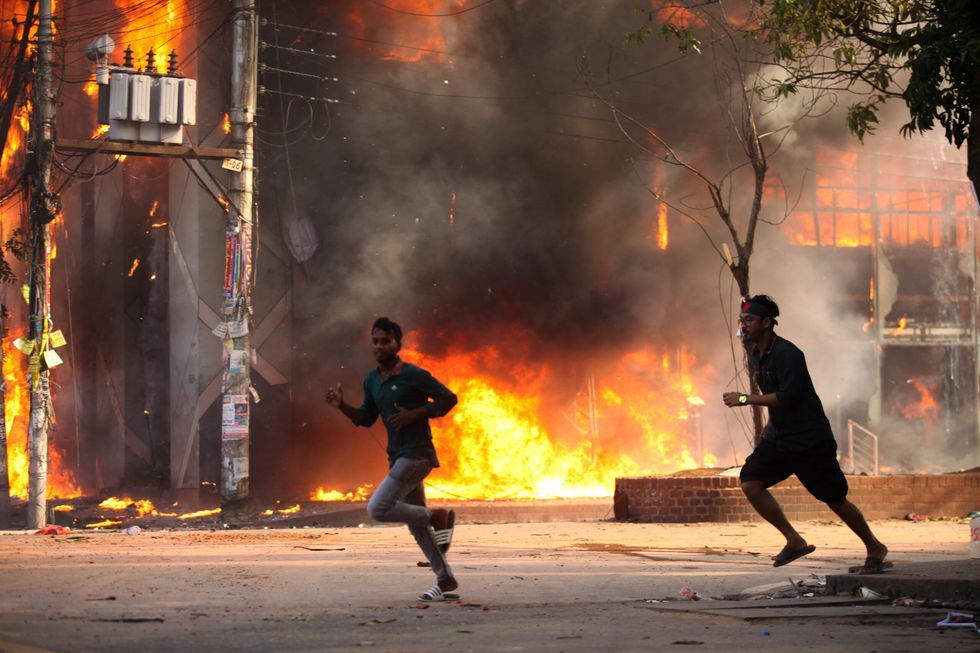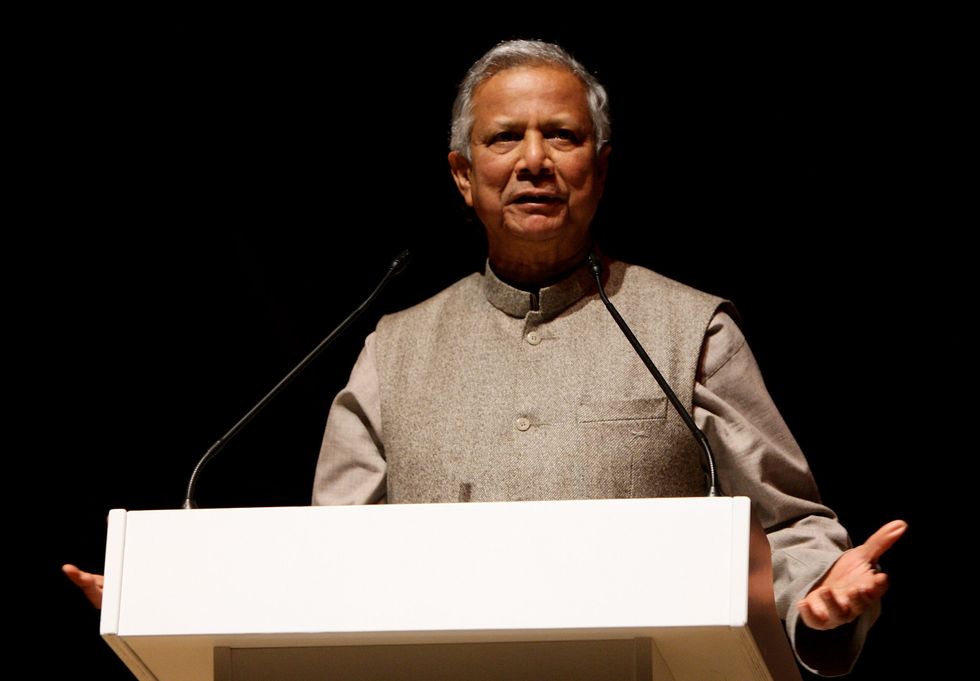BANGLADESH has been gripped by turmoil for a while now, and the dramatic ouster of prime minister Sheikh Hasina has created an unprecedented situation in the country. After winning a record fourth consecutive term in January 2024, Hasina's rule came to an abrupt end due to massive protests and escalating violence.
Hasina arrived in India on Monday evening in a Bangladesh Air Force aircraft after fleeing her country. She will stay in India until she receives asylum in the UK.
The student-led demonstrations began in July 2024 against a controversial quota system in government jobs. The protests quickly gained momentum, spreading across the nation and drawing widespread support from various segments of society, leading to nationwide unrest.
The situation escalated when the government's response to the protests was perceived as heavy-handed, leading to clashes between protesters and security forces.
Reports indicate that over 300 people were killed in the violence. The government’s attempts to quell the unrest, including imposing curfews and internet blackouts, only fuelled public anger.
Bangladesh's army chief General Waker-Uz-Zaman has said that the military would form an interim government to restore order and oversee new elections.
This dramatic turn of events marked the end of Hasina’s 15-year rule, during which she was credited with significant economic development but also criticised for increasing autocratic tendencies and suppressing dissent.

Here’s a look at key events leading to the ouster of Hasina:
July 1: Blockades begin
The protests were sparked by university students who began blockading roads and railway lines, demanding reforms to a quota system for public sector jobs. The students argued that the system was being used to favour loyalists of Hasina’s ruling Awami League, compromising meritocracy and fairness in government hiring.
July 16: Violence intensifies
The situation escalated when six people were killed in clashes between protesters and pro-government supporters. The violence prompted the government to order the closure of schools and universities nationwide, a move that further inflamed tensions.
July 18: Prime minister rebuffed
Hasina’s appeal for calm was rejected by the protesters, who continued their demonstrations. The government’s attempt to control the situation through an internet blackout and curfews failed as protests intensified. Protesters torched government buildings, including the headquarters of state broadcaster Bangladesh Television.
July 21: Supreme Court Verdict
The Supreme Court ruled that the decision to reintroduce job quotas was illegal. However, this did not satisfy the protesters' demands for the complete abolition of the quota system, leading to further unrest.
August 5: Hasina flees
The culmination of the protests saw Hasina fleeing Dhaka as thousands of protesters stormed her palace. With millions on the streets celebrating, the military stepped in, and General Waker-Uz-Zaman announced that Hasina had resigned.
Sheikh Hasina and Bangladesh’s political history
Sheikh Hasina, the daughter of Bangladesh's founding father Sheikh Mujibur Rahman, has been a dominant figure in the country's politics. Her political career began in the wake of personal tragedy when her father and most of her family were assassinated in a military coup in 1975.
Hasina, who was abroad at the time, later returned to Bangladesh and took leadership of the Awami League, a party founded by her father.
Hasina first became prime minister in 1996, lost power in 2001, but returned in 2009, leading Bangladesh for 15 years until her recent ouster.
Her tenure saw significant economic growth, with Bangladesh’s per capita income tripling and its GDP growing at impressive rates.
Hasina was also praised for her handling of the Rohingya refugee crisis and maintaining balanced relations with both India and China.
However, her rule was marred by allegations of autocracy, with mass arrests of political opponents, suppression of dissent, and increasing corruption.
The opposition Bangladesh Nationalist Party (BNP) and its allies frequently boycotted elections, citing unfair practices and government intimidation.
The BNP’s leader, Khaleda Zia, a former prime minister and long-time rival of Hasina, was imprisoned on corruption charges, further polarising the political landscape.

History of political upheaval in Bangladesh
Bangladesh’s political history has been turbulent, marked by coups and assassinations. Following its independence from Pakistan in 1971, the country saw its first prime minister, Sheikh Mujibur Rahman, assassinated in 1975.
Subsequent years witnessed a series of military coups, with General Ziaur Rahman taking power in 1977. He, too, was assassinated in 1981, leading to General Hussain Muhammad Ershad’s takeover in 1982. Ershad’s rule ended in 1990 after mass protests, leading to a brief period of democratic governance.
The country has oscillated between democratic and military rule, with the army playing a significant role in politics. The most recent military intervention prior to Hasina’s ouster occurred in 2007, when the army backed a caretaker government that ruled until elections in 2008.
The Road ahead
Nobel laureate Muhammad Yunus announced on Tuesday that he is ready to head an interim government in Bangladesh. “I am honoured by the trust the protesters have placed in me to lead the interim government,” Yunus said, according to AFP.
This announcement came after Bangladesh president Mohammed Shahabuddin dissolved the parliament on Tuesday, clearing the way for an interim government and new elections.

The downfall of Sheikh Hasina marks a significant turning point in Bangladesh’s political landscape. The interim government, led by the military, faces the challenge of restoring order and overseeing a credible electoral process.
Michael Kugelman, director of the South Asia Institute at the Washington-based Wilson Center, warned that Hasina's departure "would leave a major vacuum" and that the country was in "uncharted territory". "The coming days are critical," AFP quoted him as saying.
UN secretary-general Antonio Guterres stressed the importance of a "peaceful, orderly and democratic transition."
Foreign secretary David Lammy called for an end to the violence and a full UN-led investigation into the events of the past weeks. “All sides now need to work together to end the violence, restore calm, de-escalate the situation, and prevent any further loss of life,” Lammy said.
The international community will be closely watching developments in Bangladesh due to the country's strategic importance in South Asia and its role as a major garments manufacturing hub.
(With inputs from news agencies)



















